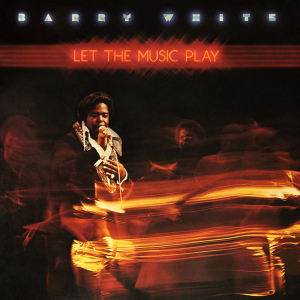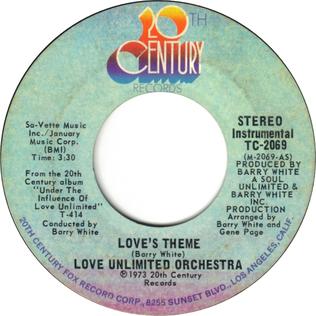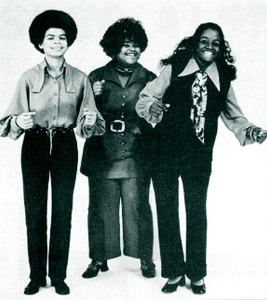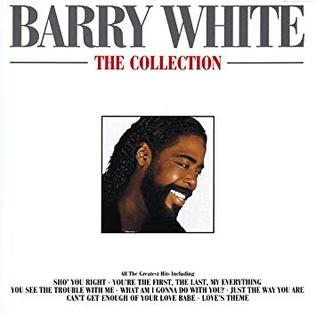
Barry Eugene Carter, better known by his stage name Barry White, was an American singer and songwriter. A two-time Grammy Award winner known for his bass voice and romantic image, his greatest success came in the 1970s as a solo singer and with The Love Unlimited Orchestra, crafting many enduring soul, funk, and disco songs such as his two biggest hits: "Can't Get Enough of Your Love, Babe" and "You're the First, the Last, My Everything".

Ray Erskine Parker Jr. is an American musician, songwriter, and record producer. As a solo performer, he wrote and performed the theme song to the 1984 film Ghostbusters. Previously, Parker achieved a US top-10 hit in 1982 with "The Other Woman". He also performed with his band, Raydio, and with Barry White.

The Ultimate Collection, aka Gold and, later, Icon 2, is a retrospective 2-disc set of Barry White's career that was released in 2000. In 2008, it was substantially re-released as part of Universal Music's Gold series with the addition of the song "Baby, We Better Try To Get It Together" and the removal of the song "Love Makin' Music".
Love Unlimited was a female vocal trio that provided backing vocals for American singer-songwriter Barry White on his albums and concert tours. They also found success with their own recordings.

Let the Music Play is the self-produced fifth album by American R&B singer Barry White, recorded in 1975 and released in January 1976 on the 20th Century label.

Love and Dancing is a remix album by English synth-pop band The Human League, released in July 1982 by Virgin Records. Issued under the band name "The League Unlimited Orchestra" as a nod to Barry White's disco-era Love Unlimited Orchestra, the album was principally the idea and work of producer Martin Rushent and contains dub-style, largely instrumental remixes of songs from the band's multi-platinum selling album Dare (1981), along with a version of the track "Hard Times", which had originally been the B-side of the single "Love Action ". Rushent was inspired by hip hop turntablist Grandmaster Flash and created Love and Dancing on a mixing board. He created vocal effects by cutting up portions of the Dare tape and manually gluing them together. In total, over 2,600 edits feature on the album.

"Love's Theme" is an instrumental piece written by Barry White around 1965. Recorded and released as a single by White's Love Unlimited Orchestra in 1973, it was one of the few instrumental and purely orchestral singles to reach #1 on the Billboard Hot 100 chart in the United States, which it did in early 1974. Billboard ranked it as the #3 song for 1974.

"Can't Get Enough of Your Love, Babe" is a song written, recorded, and produced by American musician Barry White. Released in June 1974 as the first single from his third album, Can't Get Enough (1974), the song topped the US Billboard Hot 100 and Billboard R&B charts and has since become one of his signature tunes. It was his second US chart-topper, after "Love's Theme". It became a gold record in the US. White performed this song live on The Midnight Special in 1974, and on Soul Train on May 24, 1975.

The Fuzz was an American female vocal trio from Washington, D.C. They started out in 1970 as The Passionettes, but changed their name when they signed to Calla Records in 1971. Their self-titled debut, which came out that year, was significant in that it was one of the first "concept" albums by a female artist and interspersed monologues and musical selections, built around a theme comparing love to the four seasons. Further, most of the songs were written by a group member. The group had a great influence on the style Love Unlimited would later popularize under the tutelage of Barry White. The single "I Love You for All Seasons" went Top 10 on the US Billboard R&B chart and peaked at #21 on the US Billboard Hot 100. The follow-up single, "Like an Open Door", hit #14 on the R&B chart, and after releasing two more singles with little or no success, they disbanded in 1972. The group reunited in the 1990s and performed at the Art Leboe Concert Hall in California with a new member on September 11, 2010, more than two years after the death of Barbara Gilliam, and with Val Williams and two new members at The WAVE's Love Affair Concert at Honda Center, Anaheim, California on February 11, 2017.
The Love Unlimited Orchestra was a 40-piece string-laden orchestra formed by American singer Barry White, and serving as a backing unit for White and for female vocal trio Love Unlimited. From the early 1970s on, they also recorded several singles and albums under their own name.

"I'm Gonna Love You Just a Little More Baby" is a song written, produced and recorded by Barry White.
"I've Got So Much to Give" is an R&B contemporary romantic ballad composed and recorded by popular soul artist Barry White and released in 1973. It was originally conceived by White as a single but then featured on the album of the same name, that peaked at number one on the Hot R&B Albums Chart.

From a Girl's Point of View We Give to You... Love Unlimited is the debut studio album of American soul vocal trio Love Unlimited, released in 1972 on Uni/MCA Records. Produced by soul recording artist Barry White, for whom the trio served as a backing group at the time, the album was arranged by White and conductor Gene Page. It was digitally remastered by recording engineer Bill Inglot and reissued on May 10, 1994 by Varèse Vintage.
Felice Taylor was an American soul and pop singer, best known for her recordings in the late 1960s.

Just Another Way to Say I Love You is the self-produced fourth album by American R&B singer Barry White, released in 1975 on the 20th Century label.

I've Got So Much to Give is the debut studio album by American R&B singer Barry White, released on March 27, 1973, on the 20th Century label.

Barry White's Greatest Hits is the first greatest hits album released by the singer Barry White. It was originally released as a vinyl LP in 1975, and re-released on CD in 1988.
"I Feel Love Comin' On" was a 1967 song that became an international success for the African-American singer Felice Taylor. The song was written and produced by Paul Politi and Barry White, and recorded with musical accompaniment by the Bob Keane Orchestra.

The Collection is a compilation album by American R&B singer Barry White, released in 1988.

Sheet Music is the self-produced eleventh album by American R&B singer Barry White, and the second release on his own CBS-affiliated custom label, Unlimited Gold. Although it peaked at #19 in the R&B charts, it was a commercial disappointment. "Love Makin' Music" was the most successful of the single releases, peaking at #25 in the R&B charts. White also recorded this track as well as "She's Everything to Me" in Spanish for the Latin-American market as "Mi nueva canción" and "Ella es todo para mí" respectively. The London branch of CBS Records went for "Rum and Coke" as the second single, but as none of his singles on his new labels had managed to reach the UK Singles Charts, they stopped releasing any further singles off any of his following 4 albums. The Netherlands belatedly released the track "Ghetto Letto" as a single in August 1981, choosing it over White's then current single "Louie Louie".















